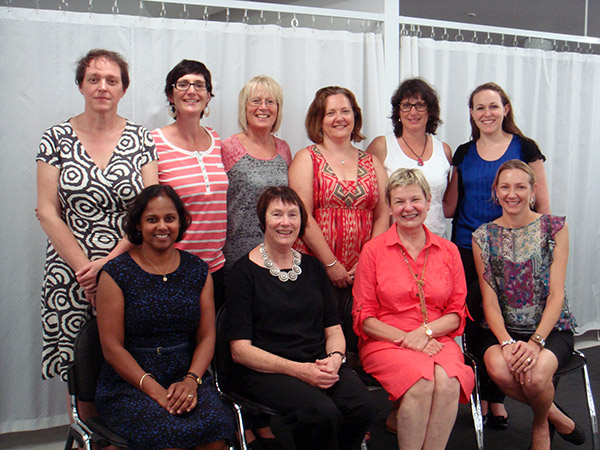The Occupational Performance Network hosted its first PRPP Assessment Course in Sydney from the 10-14 February. The course was attended by 41 occupational therapists from across Australia, including NSW, Qld., Vic., SA, NT, and WA. Therapists worked in the areas of adult and pediatric neurology, learning disabilities and sensory processing impairments, aged care, mental health and higher education. They see babies through to the very elderly from English and non-English speaking and indigenous backgrounds who live in city, suburban, rural and remote settings.
Category Archives: News
PRPP International Instructors Network inaugural meeting held
PRPP International Instructors Network - Southern Hemisphere Group
The inaugural meeting of the International PRPP Instructors Network (Southern Hemisphere Branch), took place in Lidcombe, NSW from the 17-19 February. This meeting was attended by 10 current and future PRPP instructors from Australia and New Zealand with one participant travelling from the Netherlands. Future meetings with European, Scandinavian and North American instructors are planned.
Sydney PRPP Courses planned
A four day PRPP Intervention course is planned for early 2015. Participants will be qualified occupational therapists who have completed a full PRPP Assessment course. Expressions of interest are now open. One day PRPP Assessment updates are scheduled for the second half of 2014. If you have completed a full five day PRPP Assessment course in the past and wish to have your knowledge and skill refreshed, please contact us. Another five day PRPP Assessment course is also planned for 2015.
OT Australia Conference – Papers accepted
Several scientific papers and posters on topics related to the Occupational Performance Model (Australia), the PRPP System and upper limb assessment and recovery post acquired brain impairment have been accepted for presentation at the July OT Australia Conference in Melbourne.
Dr. Chapparo speaking at the NDTA 2015 Conference in Orlando
Dr. Christine Chapparo will be giving two keynote addresses at the Neuro-Developmental Treatment Association (NDTA) 2015 Conference “Mind Your Movement: Learning and Cognition in NDT” in Orlando, Florida 1-3 May. See www.NDTA.org/NDTA15
PRPP Courses in Sydney, February 2015
The Network sponsored a PRPP Assessment Course and a PRPP Intervention Course in Sydney in February. Both courses were full (40) with many on the waiting list. Therapists came from all over Australia with a few coming from New Zealand. Keep an eye on ‘Courses’ for information about future courses in Australia and abroad. The Event Archive will tell you where courses have been.
Dr. Judy Ranka teaching in stroke course in Myamar
Dr. Judy Ranka will be part of the multidisciplinary teaching team delivering a short course on “Orthotic and Therapeutic Management of Stroke” in Yangon, Myanmar 8-11 September. This course is sponsored by the International Society of Orthotists and Prosthetists (ISPO) and the Certified Prosthetists and Orthotists group in Yangon, Myanmar, and has previously been delivered in Columbo, Sri Lanka (2013) and Bangkok, Thailand (2014).
ULPA courses Sydney 2016
Two Upper Limb Performance Courses (ULPA) offered in 2015 were fully subscribed. We are asking for Expressions of Interest in further courses. To register your interest, clique here. Note that no course will occur on 1 January. Dates have not been set.
PRPP courses Sydney 2016
A PRPP Assessment and a PRPP Intervention course will be offered in February, 2016 in rooms at the Cumberland College Campus of The University of Sydney. See ‘Courses’ for more information and to register.
Participate in adult cognitive rehabilitation survey research now
Researchers from Charles Sturt University, The University of Sydney and NSW Health are investigating the experiences of occupational therapists working with adults who have neurocognitive disorders. This 10 minute survey aims to determine the level of knowledge that occupational therapists in Australia have about evidence relating to adult cognitive rehabilitation, and also to identify what factors help or make it harder to implement new cognitive rehabilitation approaches. The online survey is anonymous and can be accessed at:

